- Home
- John Boyne
The Thief of Time Page 2
The Thief of Time Read online
Page 2
A mistake, as it turned out.
Chapter 3
January 1999
I live in a pleasant, south-facing apartment in Piccadilly, London. It is the basement flat of a four-storey house. The upper part of the property is lived in by a former minister in Mrs Thatcher’s cabinet whose attempts to secure a place in the Lords were given short shrift by her successor Mr Major – whom he despised for an incident at the Treasury some years before – and who has since wound up in the less prestigious but far more financially rewarding world of satellite broadcasting. As a major shareholder in the corporation which employs my upstairs neighbour, I take an interest in his career and was partly responsible for his being granted a thrice weekly political chat-show, which has recently been performing badly in the ratings, owing to the general perception of him as a has-been. Although I find the public’s belief that anyone from the previous decade is a has-been completely absurd – surely my own longevity is testament to that – I suspect that the man’s career is coming to an end and I regret it, for he is a pleasant enough man with a taste for fine things, in which respect we are quite similar. He has been kind enough to invite me into his home on a number of occasions and I once dined off a rather fine piece of mid-nineteenth-century Hungarian dishware which I could have sworn I saw being made in Tatabanya while I was honeymooning with, if I remember correctly, Jane Dealey (1830-1866, m. 1863). Lovely girl. Fine features. Awful end. I could afford to live in the same luxury as my broadcasting friend but really can’t be bothered. Right now, simplicity suits me. I’ve lived rough and I’ve lived well. I’ve slept on streets and collapsed drunk in palaces, a felonious vagrant or vomiting fool. I’ll most likely do both again. I took the apartment in 1992 and have been here ever since. I’ve made it quite the home. There is a small vestibule as you enter the front door, leading into a tiny hallway which opens out into the living room – sunken by a step – with a beautiful set of bay windows. Here, I keep my books, my recordings, my piano and my pipes. Scattered around the rest of the apartment is a bedroom, a bathroom and a small guest room which is only ever used by my many times removed nephew Tommy, who calls around to see me from time to time, whenever he needs cash.
Financially, I have been fortunate in life. I cant quite put my finger on how I made my money but there’s an awful lot of it there. Most of it has grown without my realising it. To make the leap from the Dover boat to my position today there are certainly many jobs and positions which I have taken but I think I have been lucky in that I always kept my money as money, never stocks, never shares, never insurance policies or pensions. (Life insurance is a waste of money as far as I am concerned.) I had a friend – Denton Irving – who lost a bundle in the Wall Street crash in the early part of this century. One of those chaps who threw himself from his office window out of a sense of failure. Foolish chap; personalising something which the whole country went through. It was hardly his fault. Even as he jumped he could surely see half of New York’s Old Money standing in their hotel windows, contemplating their own ends. Actually, he even failed at that. He misjudged the distance and ended up with a broken leg, a smashed arm and a couple of fractured ribs in the middle of the Avenue of the Americas, screaming in agony for about ten seconds before a tram came around the corner at speed and finished him off. He got what he wanted, I suppose.
I have always spent money too, believing that there’s precious little point in having the stuff if you don’t use it to make yourself comfortable. I have no offspring so there’s no one to leave it to in the unlikely event of my death – except for the current Tommy, of course -and, even if there were, I rather feel a person should make his or her own way without any outside help.
I never criticise the times either. I know a couple of young chaps of about seventy or eighty who complain about the world that they’re living in and the changes which constantly take place in it. I speak to them every so often in my club and I find their disdain for Today a little ridiculous. They refuse to have so-called modern contraptions in their homes, feigning a lack of comprehension whenever a telephone rings or someone asks them for their fax number. Nonsensical. The telephone predates them, for heaven’s sake. I say take whatever the age offers you. That’s what living is all about. Personally, I think the late twentieth century has been perfectly all right. A little dull at times, perhaps, although I did become momentarily obsessed with the American space programme during the 1960s, but it’ll do for now; I’ve known worse. You should have tried things a century earlier. End of the nineteenth. I have about two memories of a twenty-year period back then, things were so dull. And one of those is simply of a bad back complaint that kept me in bed for six months.
In mid-January, Tommy phoned me and invited me to dinner for the fourth time in three weeks. I hadn’t laid eyes on him since before Christmas and had so far managed to put him off. But I knew that any further delay would induce him to come around late at night, and whenever he did that he would end up staying over – something I discouraged. Overnight guests are fine the night before, when there’s a drink to be taken and a conversation to be had, but in the morning there’s always an awkwardness when you are wishing they would just go home and let you get on with your routine. He’s not my favourite of the Thomases, certainly not a patch on his great-great-great-grandfather, but he’s not the worst either. There’s a certain charming arrogance to the lad, a mixture of self-confidence, naivete and recklessness which attracts me. At twenty-two, he’s a twenty-first-century boy if ever I saw one. If he can simply make it that far.
We met in a West End restaurant which was a little busier than I had hoped. The problem with being seen in public with Tommy is that it’s impossible to spend any private time with him whatsoever. From the minute he walks into a room until the minute he walks out, everyone is staring and whispering and casting furtive glances at him. His celebrity both intimidates and hypnotises people in equal parts and I have the dubious thrill of being caught up in it all. Last Tuesday night was no different. He arrived late and almost collapsed through the door, smiling as he came towards me in a dark Versace suit with a dark shirt and dark tie to match, looking like something from a funeral parlour or an Italian-American Mafia film. His hair was cut jagged just above the shoulder and he sported a two-day stubble. He fell into the seat, grinning at me and licking his lips, oblivious to the silence that had fallen on the restaurant. Thrice weekly appearances in the living rooms of the nation, not to mention the omnibus repeats at the weekend, have made my nephew into something of a celebrity. And the consistency of that celebrity has made him immune to its accompanying irritations.
Tommy, like so many of the Thomases before him, is a handsome boy and as he matures (physically) he only becomes more attractive to people. He has been in his television programme for eight years now, ever since he was fourteen, and has moved from being a teenage sensation, to a magazine cover boy, to a twenty-two-year-old national treasure. He has enjoyed two number one singles (although his album failed to make the top ten) and even spent six months in a production of Aladdin in the West End where there was widespread screaming whenever he appeared in his waistcoat, pantaloons and precious little else. He is fond of recounting how he was voted ‘most shaggable boy’ four years running in some teen magazine, a title that chills me but delights him. He knows the television business inside out. He’s not really an actor, he’s a star.
His screen persona is that of a good hearted angel, not too blessed in the brains department, to whom nothing good ever happens. Since his first appearance in the programme in the early nineties, his character has appeared to find no reason whatsoever to leave a one mile radius of London. I’m not even sure he knows that any other world exists. He has grown up there, gone to school there, and now works there. He has had several girlfriends, two wives, enjoyed an affair with his sister and an unconsummated romance with another boy – quite controversial at the time – was briefly being considered by an important football club before leukaemia laid h
im low, had a great love for the ballet which he was obliged to keep secret, flirted with drink, drugs and athletics, and has done God only knows how many other things in his illustrious career. Any other boy would be dead by now with all the exertions that have come his way. Tommy – or ‘Sam Cutler’ as the nation better knows him – lives on and always comes back for more. He has, for want of a better word, pluck. Apparently this endears him to grandmothers, mothers and daughters alike, not to mention quite a few young men who copy his mannerisms and catchphrases with gay abandon.
‘You look ill,’ I told him as we ate, glancing briefly at his pale, blotchy skin and the red rings hovering beneath his eyes. ‘And can we please just eat in peace?’ I begged a hovering waitress who was holding a notebook and pen expectantly as she stared at her hero with barely disguised lust.
‘It’s the make-up, Uncle Matt,’ said Tommy. ‘You have no idea what it does to my skin. I used it at first because you need a little for the cameras, but then it affected my skin so badly that I needed even more to look any way normal. Now I look like Zsa Zsa Gabor on screen and Andy Warhol off.’
‘Your nose is inflamed,’ I observed. ‘You take too many drugs. You’ll burn a hole in it one of these days. Just a suggestion, but perhaps you should try injecting rather than inhaling?’
‘I don’t do drugs,’ he shrugged, his voice perfectly even, as if he felt it was simply the socially correct thing to do – denying it, I mean – while being completely aware that neither of us believed him for a moment.
‘It’s not that I’m opposed to it, you understand,’ I said, dabbing at my lips with a napkin. I was hardly in a position to lecture him. After all, I was an opium fiend at the turn of the century and I survived it. Lord, what I went through with that though. ‘It’s just that the drugs that you take will kill you. Unless you take them right, that is.’
‘Unless I what?’ He looked at me, baffled, grasping a hand around the base of his wine glass and rotating it slowly.
‘The problem with today’s young people’, I said, ‘isn’t that they do things which are bad for them, as so much of the media likes to think. It’s that they don’t do these things right. You’re all so intent on getting off your heads on drugs that you don’t think about the fact that you could overdose and, to put it plainly, die. You drink until your liver explodes. You smoke until your lungs collapse beneath the rot. You create diseases which threaten to wipe you out. Have fun, by all means. Be debauched, it’s your duty. But be wise about it. All things in excess, but just know how to cope with them, that’s all I ask.’
‘I don’t do drugs, Uncle Matt,’ he repeated, his voice firm but unconvincing.
‘Then why do you want to borrow money from me?’
‘Who says I do?’
‘Why else would you be here?’
‘The pleasure of your company?’
I laughed. It was a nice thought, if nothing else. I enjoyed the way he stuck to convention. ‘You’re so famous,’ I observed, mystified by the very idea. ‘And yet you’re paid so little. I don’t understand that. Why is it exactly? Explain it to me.’
‘It’s a catch-22,’ said Tommy. ‘There’s a standard rate for what I do, and it’s not very high. I can’t leave because I’m typecast now and would never get another job – unless I went into production or something, which is exactly what I should do because I know this industry from the top down. I’ve seen every kind of scam pulled and every kind of deal ruined. That’s what I want to look towards when I get older. Eight years playing some gormless fuck on some stupid TV show doesn’t exactly lead to a Martin Scorsese movie, you know. For Christ’s sake, I’m lucky if I get offered the chance to press the button on the National Lottery more than once a year. You know I was supposed to do that a couple of months ago but they bumped me?’
‘Yes, you mentioned.’
‘And for Madonna of all people. Madonna! For Christ’s sake, how am I supposed to compete with that? And I work for the fucking BBC, she doesn’t. You’d think they’d show a little bit of loyalty. But the lifestyle I lead to perpetuate my success demands a certain level of solvency. I can’t win. I’m like a hamster on a wheel. I’d take on some advertising, do a little modelling perhaps, but it’s in my contract that I’m not allowed to promote any products while still working on the show. Otherwise I swear I’d be a capitalist whore right now. I’d advertise everything from aftershave to tampons if I could.’
I shrugged. It made sense, I suppose. ‘I can let you have a couple of thousand,’ I said. ‘But I’d rather pay off some of your bills for you than just give you cash outright. You don’t have men after you by any chance, do you?’
‘Men. Women. Anything with a pulse follows me down the street,’ he said with a cocky smile. ‘I got my teeth bleached last week, by the way,’ he added as a non sequitur, pulling back his lips to show me a melon slice of snow-white teeth. ‘They look good, don’t they?’
‘Men,’ I repeated. ‘Don’t play stupid with me. Save it for your show.’
‘What kind of men? What do you mean?’
‘You know exactly what I mean, Tommy. Loan sharks. Dealers. Men of dubious character.’ I leaned forward and stared him in the eye. ‘Do you owe people money?’ I demanded. ‘Is that what you’re worried about? I’ve seen men laid low by such people. Ancestors of yours, for example.’
He sat back and his tongue skirted around the inside of his mouth slowly. I could see it pushing his left cheek out slightly as he watched me. ‘I could do with a couple of grand,’ he said. ‘If you’ve got it to spare. ‘I’m sorting myself out, you know.’
‘Oh, I’m sure you are.’
‘It’s all going to come together for me.’
‘I hope it does,’ I said dismissively, standing up and adjusting my tie slightly as I made to leave. ‘I have your account details at home. I’ll post the money for you tomorrow. When can I expect to hear from you next? A couple of weeks? Will you have spent it all by then?’
He smiled at me and sat back with a shrug. I touched him lightly on the shoulder as I said goodbye, admiring the silk in his shirt, which couldn’t have come cheap. He has a taste for clothes, the current Tommy. When he dies, the tabloids will have a field day with him.
Chapter 4
Living with Dominique
Dominique, Tomas and I stayed in Dover for the best part of a year. I perfected my English and learned to speak with only a trace of an accent, which I could turn on or off at will. I became a professional pick-pocket, wandering the streets from six in the morning until late at night relieving people of their wallets and pocketbooks. I became quite good at it. No one ever felt my hand slip inside the long sleeves of their overcoats, my fingers quickly locating a valuable, a watch, some coins and swallowing them up quickly, but from time to time I misjudged the streets and some civic-minded individual would spot me and raise an alarm. A chase would ensue – often an enjoyable one — and I almost always won, as I was sixteen years old then and in peak condition. The three of us lived well from my dubious endeavours and rented a small room at the back of a public house which was not too dirty or rat-infested. There were two beds in the room, one for Dominique and one for Tomas and me. In the six months since we had first met, we had never enjoyed a repeat of that first night. And Dominique’s feelings towards me had become increasingly fraternal. I would lie awake at night, listening to the sounds of her breathing, and sometimes I would crawl over to her bed slowly and feel that night-tinged breath on my face. I would watch her as she slept, racked with the desire to share her bed again.
Dominique observed a slightly distant maternal feeling towards Tomas, taking care of him while I went out to steal, but relinquishing him to me immediately upon my return, almost as if she was simply a childminder, employed to look after the infant and accepting my payment for her work at the end of each day. Tomas was a quiet child, most of the time, and didn’t cause much trouble to either of us and, on those rare occasions when we would all spend the evening
in our room together, he tended to fall asleep early, allowing us to sit up and talk late into the night, Dominique telling me about her plans for the future, while my mind was always set on seducing her once again. Or allowing her to seduce me, whichever would come first.
‘We should leave Dover,’ she said to me one night, as it came close to being a full twelve months since we had first arrived. ‘We’ve been here far too long.’
‘I like it here,’ I said. ‘We have enough to get us through every day. We eat well enough, don’t we?’
‘I don’t want to eat “well enough”,’ she said in frustration. ‘I want to eat well. I want to live well. We’ll never get that here. There’s no future for us here. We have to move on.’
‘But where would we go?’ I asked. I could travel all the way from France to England, but once settled I couldn’t imagine a world outside of our small room and my kaleidoscope streets. I was happy there.
‘We can’t survive on your pick-pocketing for ever, Matthieu. I can’t, anyway.’
I thought about it and stared at the floor. You want to return to France?’ I asked and she shook her head quickly.
‘I’ll never return to France,’ she said. ‘Never.’ She hadn’t told me much at that time about why she had left the country of her birth, but I knew that it had something to do with her father, who drank. She was never the kind of girl who opened up very much. It always amazed me that in the few short years that we knew each other, she was never as honest with me as she was on the very first day that we had met. For Dominique, unlike most people I have known in my life, with familiarity grew distance. ‘We could go to the country,’ she suggested. ‘I could find work there.’

 Beneath the Earth
Beneath the Earth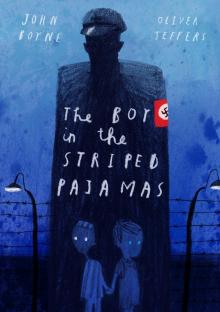 The Boy in the Striped Pajamas
The Boy in the Striped Pajamas Next of Kin
Next of Kin The House of Special Purpose
The House of Special Purpose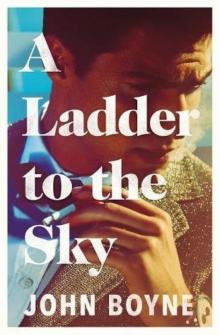 A Ladder to the Sky
A Ladder to the Sky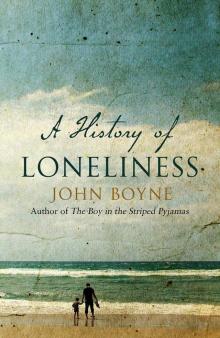 A History of Loneliness
A History of Loneliness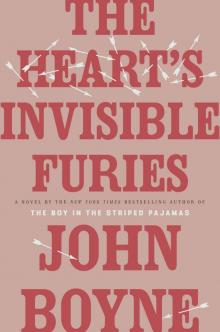 The Heart's Invisible Furies
The Heart's Invisible Furies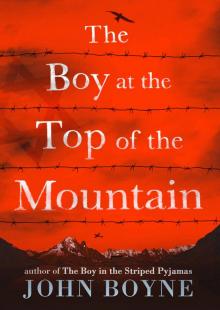 The Boy at the Top of the Mountain
The Boy at the Top of the Mountain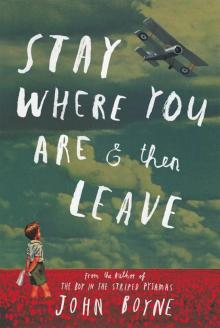 Stay Where You Are and Then Leave
Stay Where You Are and Then Leave Crippen: A Novel of Murder
Crippen: A Novel of Murder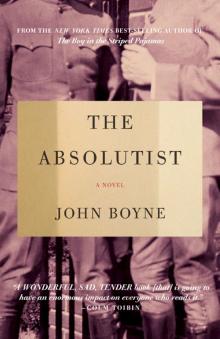 The Absolutist
The Absolutist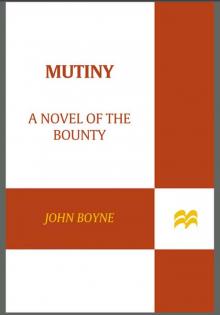 Mutiny: A Novel of the Bounty
Mutiny: A Novel of the Bounty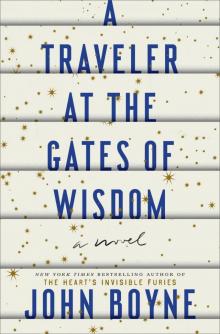 A Traveler at the Gates of Wisdom
A Traveler at the Gates of Wisdom The Congress of Rough Riders
The Congress of Rough Riders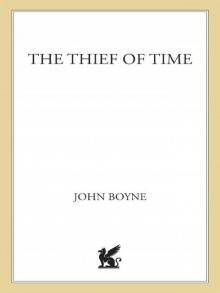 The Thief of Time
The Thief of Time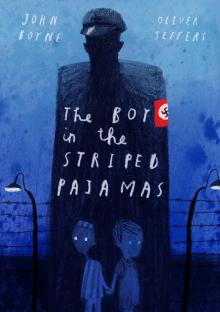 The Boy in the Striped Pajamas (Deluxe Illustrated Edition)
The Boy in the Striped Pajamas (Deluxe Illustrated Edition)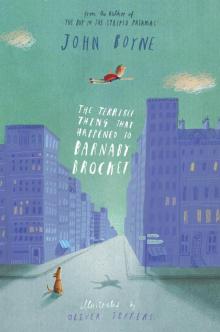 The Terrible Thing That Happened to Barnaby Brocket
The Terrible Thing That Happened to Barnaby Brocket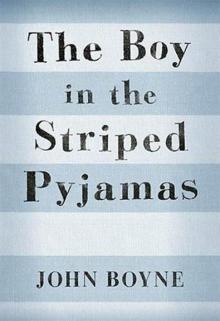 The Boy In The Striped Pyjamas
The Boy In The Striped Pyjamas Crippen
Crippen